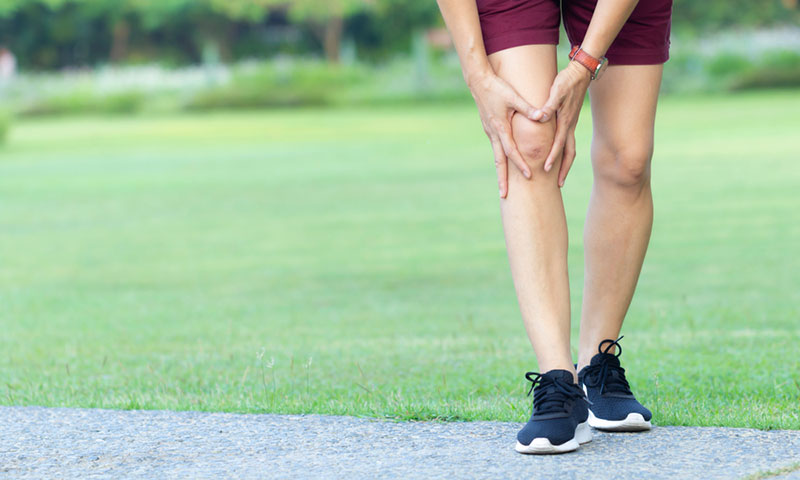Last Updated on January 3, 2023
Growing pains are a common occurrence in teenagers. While the pain is usually felt in the legs, it can also be felt in the knees. The pain is typically intermittent and not severe enough to interfere with daily activities.
Growing pains are believed to be caused by the rapid growth that occurs during puberty. This growth can put pressure on the muscles, joints, and bones, which can lead to pain. Treatment for growing pains generally includes rest, ice, and over-the-counter pain medication.
In most cases, the pain will resolve on its own within a few months. If the pain is severe or persists for longer than a few months, it is important to see a doctor to rule out other potential causes of knee pain.
Stop Knee Pain Now! 5 Exercises To Strengthen Your Knees
Knee pain is a common complaint among teenagers. There are many possible causes of knee pain, including overuse injuries, arthritis, and growth-related problems. Overuse injuries are the most common cause of knee pain in teenagers.
These injuries can occur from playing sports or participating in other activities that put stress on the knees. Common overuse injuries include patellar tendonitis (jumper’s knee), iliotibial band syndrome (runner’s knee), and patellofemoral pain syndrome (aka “runner’s knee”). Treatment for these injuries typically involves rest, ice, and elevation.
Physical therapy may also be recommended to help stretch and strengthen the muscles around the knee. Arthritis is another possible cause of teenage knee pain. Osteoarthritis is the most common type of arthritis and usually affects adults over the age of 50.
However, there are some types of arthritis that can affect teenagers, such as juvenile idiopathic arthritis or rheumatoid arthritis. If your teenager has arthritis, they may experience joint stiffness, swelling, and/or warmth around the affected joint(s). Treatment for arthritis typically includes medication to reduce inflammation as well as physical therapy to help maintain range of motion and muscle strength.
Growth-related problems can also lead to teenage knee pain. For example, Osgood-Schlatter disease is a condition that results from stress on the growth plate at the top of the shinbone (tibia). This condition usually affects boys aged 10-15 who play sports that involve running and jumping (such as basketball or soccer).
Symptoms include tenderness and swelling just below the kneecap (patella) where it attaches to the tibia. The good news is that Osgood-Schlatter disease usually goes away once puberty is complete and the bones have stopped growing. If your teenager is experiencing knee pain, it’s important to have it evaluated by a doctor so that an accurate diagnosis can be made and appropriate treatment can be started.
Knee Pain Teenager Growing
For teenagers, growing pains are a common occurrence. Many of them will experience some form of knee pain at some point during their growth spurts. Growing pains are usually harmless and will eventually go away on their own.
However, if your teenager is experiencing severe or persistent knee pain, it’s important to have them seen by a doctor to rule out any other underlying causes. There are a few things that can help ease growing pains in the meantime. Encourage your teenager to stay active and stretch regularly.
If they’re experiencing pain at night, try putting a heating pad on their knees for a short period of time before bed. Over-the-counter pain medication can also be helpful in managing discomfort. If you’re concerned about your teenager’s knee pain, don’t hesitate to bring it up with their doctor.
In most cases, growing pains are nothing to worry about but it’s always best to err on the side of caution when it comes to our kids’ health!

Credit: www.childrens.com
Can Knee Pain Be Caused by Puberty?
Knee pain is a common complaint among adolescents, with up to 35% of teenage boys and girls experiencing some degree of discomfort in this area. While the vast majority of cases are benign and will resolve on their own, there are a number of serious conditions that can cause knee pain during puberty. One of the most common causes of knee pain in teenagers is Osgood-Schlatter disease, which is characterised by inflammation of the tendons where they attach to the kneecap.
This condition is thought to be caused by repetitive stress on the knee joint during growth spurts, and often affects boys who play sports such as football or basketball. Treatment typically involves rest and icing the affected area, although some doctors may also prescribe anti-inflammatory medication. Another potential cause of knee pain in teenagers is patellofemoral syndrome (PFS), which occurs when there is too much pressure on the kneecap (patella).
This condition is also often seen in young athletes, especially those who participate in running or jumping activities. Treatment for PFS usually includes a combination of stretching exercises, ice application and rest from aggravating activities. In severe cases, surgery may be required to realign the kneecap.
If your teenager is experiencing persistent knee pain, it’s important to have them evaluated by a doctor to rule out any serious underlying conditions. With proper diagnosis and treatment, most cases of adolescent knee pain will eventually resolve itself without any long-term consequences.
Does Knee Pain Mean I’M Growing?
If you’re experiencing knee pain, it’s likely due to growth spurts. When you go through a growth spurt, your bones grow faster than your muscles and tendons. This can lead to temporary discomfort as your body adjusts.
Once the growth spurt is over, the pain should subside. If you’re still experiencing pain after a few weeks, or if the pain is severe, consult a doctor.
Why Do My Joints Hurt As a Teenager?
There are a number of reasons why your joints might hurt as a teenager. It could be something as simple as growing pains, or it could be a sign of a more serious condition like arthritis. If you’re concerned about your joint pain, talk to your doctor to get a diagnosis.
One common reason for joint pain in teenagers is growing pains. Growing pains are usually felt in the legs and are often worse at night. They’re caused by the bones and muscles growing faster than the surrounding tissues can keep up with, which leads to inflammation and pain.
Growing pains usually go away on their own and don’t cause any lasting damage. If your joint pain is severe, persistent, or accompanied by other symptoms like fever or rash, it might be a sign of arthritis. Arthritis is a general term used to describe inflammation of the joints.
There are many different types of arthritis, but the most common form affecting teenagers is juvenile idiopathic arthritis (JIA). JIA can cause swelling, stiffness, and pain in the joints along with fatigue and fever. It’s important to see a doctor if you think you might have JIA so that you can start treatment early and prevent long-term damage to your joints.
No matter what’s causing your joint pain, there are things you can do to help relieve it. Taking over-the-counter pain medication like ibuprofen can help reduce inflammation and pain. You can also try applying heat or cold packs to the affected area for additional relief.
If your joint pain is severe or persistent, talk to your doctor about other treatment options that may be available to you.
Conclusion
There are a few reasons why your knees might hurt as a teenager. It could be because you’re growing, and your bones are growing faster than the muscles and tendons around them. This can cause pain and stiffness in the joints.
Or, you might have arthritis, which is when the cartilage in your joints breaks down, causing pain and swelling. You could also have an injury, like a sprained ligament or meniscus tear. If you’re having knee pain, it’s important to see a doctor to find out what’s causing it and how to treat it.

